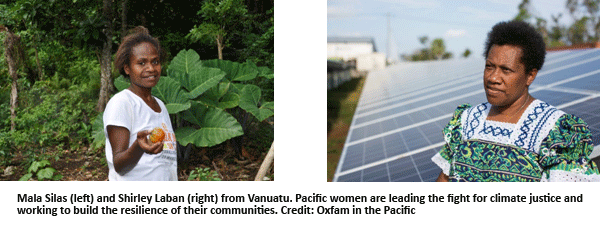Pacific Communities Building Resilience in the Face of Climate Change*

SUVA, Fiji, Nov 08 (IPS) - In the Pacific, climate change is an ever-present threat, undermining human rights, livelihoods, and security. Pacific Islanders are working with courage and resolve to build the resilience of their communities and to catalyse international actions towards ending global carbon pollution.
While the Pacific has contributed almost nothing to the causes of climate change, the region is determined to lead the world towards a more just and sustainable future. And while often labelled as ‘small island states', Pacific Island countries are more accurately characterised as ‘large oceans states' as they are custodians of vast tracts of ocean, to which their economies, culture, identities and livelihoods are inextricably tied.
Pacific Island countries are hugely diverse in their geographies and cultures – from low-lying atoll nations to volcanic archipelagos with high mountains. But all face a combination of severe challenges from climate change.
Climate change is increasing the destructive power of tropical cyclones. Many Pacific Island countries, including the Solomon Islands, Vanuatu, Fiji and the Federated States of Micronesia, lie within the south or north-western Pacific cyclone belts.
In 2016, a year after Cyclone Pam brought devastation to Vanuatu, Cyclone Winston – the strongest ever recorded in the southern hemisphere – displaced 55,000 people in Fiji (about 6 per cent of the population) and caused loss and damage worth around one-fifth of the countries' GDP.
For the atoll nations including Kiribati, Tuvalu and the Marshall Islands, rising seas and higher storm surges are inundating scarce land and contaminating scarce groundwater resources on which people depend for freshwater.
In the long-term, and without far stronger international action on climate change, atoll nations face losing much of their land area. At the same time, these and all Pacific Island communities face damage to critical marine ecosystems through ocean acidification, shifting rainfall patterns and other impacts of climate change.

Pacific peoples are determined to adapt to these growing realities and to do everything possible to avoid being displaced from their land and homes. Forced displacement epitomises the grave injustice and human rights implications of climate change. No one wants to leave, to lose their cultural ties, traditional livelihoods, and deep ancestral connection to their land.
Across the region, from the regional to the local level, Pacific governments and communities are working to confront the climate crisis. One of the many inspiring examples of community-led action comes from Vanuatu.
The Vanuatu Climate Action Network (VCAN) is a powerful example of diverse stakeholders, from community organisations through to the national government, working together to build more resilient communities to amplify the voices of Pacific Islanders on the world stage. It has enabled a broad range of local and international NGOs to pool their knowledge and resources and to draw on each other's strengths.
It has helped ensure that local communities and civil society have better access to information on climate risks and adaptation strategies, and has embraced the leadership of Ni-Vanuatu women and elevated their role in decision-making and in representing Vanuatu in international fora.
From developing climate resilient food systems built on local traditional knowledge to establishing awareness programs in schools, it has enabled communities to build on their strengths and ability to flourish amidst current and future challenges.

Similar networks exist in other Pacific countries including in Tuvalu and Kiribati, and they come together at the regional level under the Pacific Islands Climate Action Network (PICAN). They play a vital role in building local capacity to deal with climate change, in facilitating greater cooperation between government, civil society, communities and the private sector, and in responding to the needs and capacities of those on the frontlines of the climate crisis.
And, perhaps most importantly, in ensuring the voices of Pacific Islanders are heard loud and clear on the world stage. COP23 – the Pacific COP – is an unprecedented opportunity to highlight the Pacific people's determination and leadership in highlighting and driving solutions to the acute challenges facing the region from climate change.
It is time for us all to listen to those on the frontlines of the climate crisis and commit to the scale and pace of action needed to ensure a just and sustainable future for all.
*This article is part of a series profiling the activists and communities of the Pacific who are responding to the effects of climate change. Leaders from climate and social justice movements from around the world will meet in Suva, Fiji from 4-8 December for International Civil Society Week
© Inter Press Service (2017) — All Rights ReservedOriginal source: Inter Press Service
 Global Issues
Global Issues